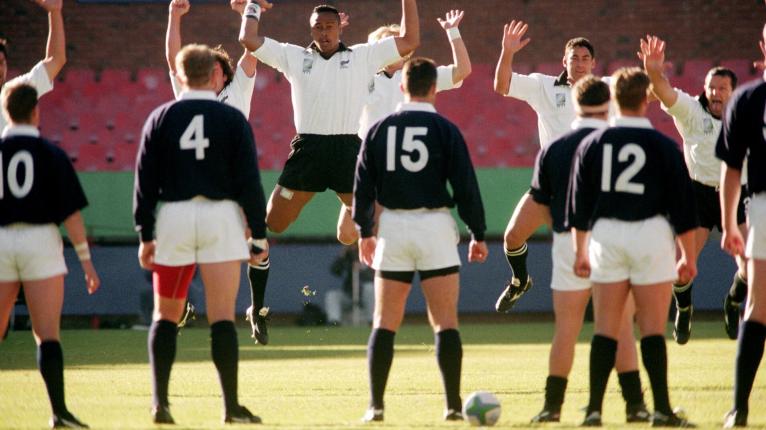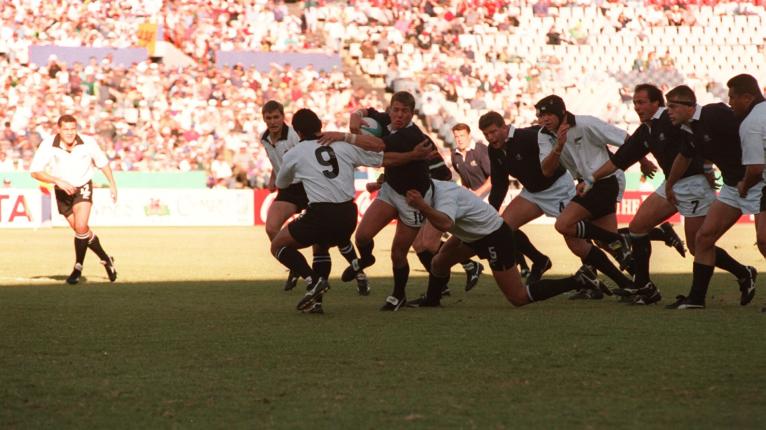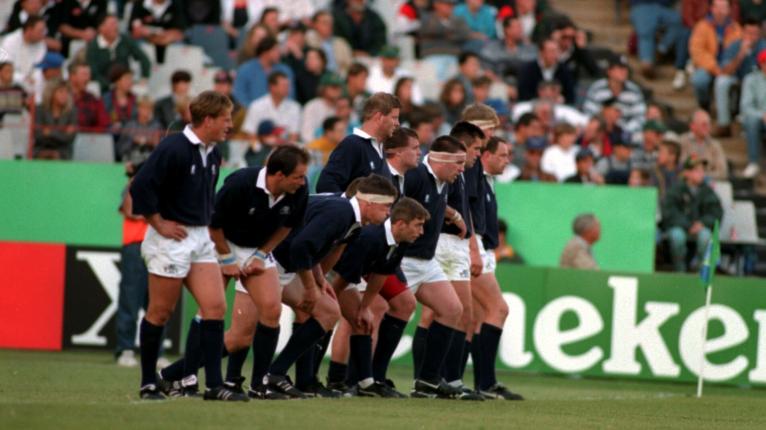Where are they now? The last Scotland team of the amateur era 25 years after their exit from the 1995 World Cup

When Scotland watched Jonah Lomu trampling over their Celtic cousins, Wales and Ireland, in the pool stages of the 1995 World Cup, you could have forgiven them for letting out a painful whimper when they saw their path to the semi-finals in South Africa meant outwitting and outmuscling Lomu and the All Blacks.
Within minutes of the June 11 quarter-finals action starting 25 years ago in Pretoria, Scotland realised Lomu was indeed New Zealand’s very own Godzilla as he went around Craig Joiner with little difficulty and popped the ball up to Frank Bunce to give them an early lead.
A trouncing looked likely but four missed kicks from Andrew Mehrtens meant that Scotland were somehow still in touch at the Loftus Versfeld interval, trailing by just 17-9 at the break.
That was as good as it got, though, for the 1991 semi-finalists. They needed a tub-thumping restart but after Gavin Hastings spilt a wicked up-and-under from Mehrtens, Walter Little was quickest to react and he skipped over unopposed.
Further scores swiftly followed, but Scotland were to rally at 45-16, enjoying a surge that meant the defeat was a mere 18 points – 48-30 – in what was their last Test match of the old amateur era before the sport officially turned professional that August.
What became of this Class of 1995? RugbyPass takes a step back in time:
15. Gavin Hastings
Usually prefixed with Scottish legend, ‘Big’ Gav – now 58 – was a talisman for Scotland for nearly a decade. He played in three World Cups and three Lions tours, captaining Scotland on 20 occasions and the Lions in 1993 with gravitas. Hastings spoke with passion and played with real verve from the backfield, thundering onto balls and tackling with venom.
A Cambridge Blue, he famously tried his hand at American football for a season after retiring from rugby. Twenty-five years on from RWC 1995, he has accrued several business interests, is a keen golfer and watches proudly as his son Adam establishes himself in the Scotland side via Glasgow.
14. Craig Joiner
A Glaswegian by birth, he won 25 caps for Scotland on the flank and had the misfortune of marking Lomu in the 1995 quarter-finals. Also able to play at 13, Joiner attended Loughborough University before playing over 140 times for Leicester Tigers and Edinburgh in the professional era. After retiring from rugby, the now 46-year-old went into investment management and currently works for Standard Life.
13. Scott Hastings
The joker to Gavin’s straight man, Scott played with a smile on his face for the majority of his 67 caps. Slightly smaller than his big brother, he had a powerful fend and arcing outside break that saw him represent the Lions in 1989 and 1993, and was a superb defender with one tackle on Rory Underwood going down in folklore as Scotland won the 1990 Grand Slam.
Now 55, since hanging up his boots he has made a successful foray into the media as a summariser for both the BBC and ITV, is an ambassador for the Support in Mind mental health charity and watches with interest as his daughter Kerry-Anne progresses with Scotland on the hockey field.

12. Graham Shiel
He won 18 caps for over a nine-year period at inside-centre. A qualified stonemason, his defence was similarly impenetrable. Someone who bisected the amateur era with Melrose and Manly after a brief stint in Australia, he played for Border Reivers and Edinburgh, going on to become academy coach at the latter.
He had a long stint as Scotland 7s skills coach and is currently the coach of Boroughmuir Bears in the Super 6. His son Charlie is a promising scrum-half who has played for Scotland at all age-grades. The 49-year-old sadly lost his father-in-law Dougie Morgan, the ex-Scotland captain, to Covid-19 in April.
11. Kenny Logan
Another great who went on to play for Scotland on 70 occasions, he was also a handy kicker, slotting 154 points with the boot. A mainstay for three World Cups, the now 48-year-old scored 13 tries in an eleven-year career.
At club level, he had two dalliances with Glasgow either side of a super successful spell with London Wasps where he won a Heineken Cup and two Premiership titles. Logan married the television presenter, Gabby Yorath, in 2001 and the couple had twins in 2005. He now runs a successful PR company, Logan Sports Marketing, as well as various charity commitments, including Sparks.
10. Craig Chalmers
‘Chick’ had a well-travelled club career that took him to Border Reivers, Edinburgh, Glasgow Harlequins and Worcester Warriors but his true love was Melrose where he played in the amateur era. He rose to the very top of the game with the British and Irish Lions on the 1989 tour to Australia.
A big character, he won 60 caps for Scotland, ending up with 166 points and a Grand Slam in 1990. As a fly-half, he was a shrewd game manager and a doughty tackler. In retirement, Chalmers, now 51, has held a number of coaching positions with Melrose, Esher and the Scotland U20s and has appeared as a media pundit.

9. Bryan Redpath
From Galashiels, he was small but immensely strong and had brilliant service that saw him win 60 caps for his country. He appeared at three World Cups and in a long club career, he played for Melrose, Narbonne and Sale Sharks before hanging up his boots and coaching at Gloucester and Sale Sharks.
In 2017, he looked outside rugby and is currently with the financial management company, Elite FX. Now 48, he keeps his hand in with rugby through his son Cameron, who played for England U20s at centre and signed a three-year deal with Bath this year after spending his academy years at Sale.
1. Dave Hilton
He was a rampaging loosehead who represented Scotland with distinction on 42 occasions. Hilton played for Bath, winning Premiership, Pilkington and European Cup titles but his Test career came to an abrupt halt when it was alleged he could not prove his grandfather Walter was born in Edinburgh.
He was banned for two-and-a-half years before qualifying through the residency rule during his time with Glasgow Warriors. He made one more Test appearance against South Africa and finished out his club career at Bristol. Post-rugby, the now 50-year-old coached at Moseley and has been a community coach with the RFU for eleven years.
2. Kenny Milne
He was a steady presence in the Scottish front row between 1989 and 1995 where he turned out for Scotland on 40 occasions. In a time when Scots crammed Lions squads, he toured on the 1993 Lions tour to New Zealand.
A brother of Iain, who made 42 appearances at prop, and David, who also won a Scotland cap, the youngest Milne brother won a Grand Slam in 1990 with his renowned workrate, tough tackling and dependability. His club career was spent at Heriot’s while working as a van driver for a Leith pie-factory. Since retiring, the now 58-year-old has built up a successful printing company and indulges in his big passion – fishing.

3. Peter Wright
A regular for Scotland between 1992 and 1996, the now 52-year-old locked down his country’s scrum on 21 occasions and his robust nature earned him a place on the 1993 Lions. A shaven-headed blacksmith from Bonnyrigg, he saw the social differences between him and his Cambridge-educated contemporaries.
Post-playing he dallied in coaching, taking charge of the Scotland U20s team and he currently presides over Glasgow High Kelvinside. He has also driven HGV lorries and been a regular BBC Radio Scotland co-commentator where he is valued for searing opinion and his down-to-earth nature.
4. Damian Cronin
Whereas Doddie Weir – all skin and bones – was easy to throw skyward, Cronin has a much sturdier build and would hit rucks and carry the ball all day long. Good enough to earn 45 caps for Scotland, the now 57-year-old was part of 1990 Grand Slam and toured with the 1993 Lions.
At club level, he turned out for Bath and London Scottish in the amateur era before spending a few years as a professional with Wasps before retiring. He is now director of Woodstone, which provides wooden and stone flooring to the likes of Apple’s Covent Garden store and the Mandarin Oriental hotel group.
5. Doddie Weir
One of the most popular players in the game, he dominated the Scotland lineout for much of the nineties on his way to 60 caps. A career highlight came in 1997 when picked to play for the British and Irish Lions only for his Test dreams to be dashed by a rogue Springbok boot.
A player for Melrose before going south of the border to Newcastle Falcons, he was loved wherever he played. A larger-than-life character off the pitch with his 6ft 6in frame standing out in tartan threads, a motor neurone disease diagnosis in 2017 gained widespread attention and he has since raised over £4million towards MND research. He celebrates his 50th birthday next month.
Doddie5 Ride 2020 has now gone virtual. July 4th you can celebrate Doddie5 50th birthday by cycling 50 miles indoors on https://t.co/AZ8JBUAXnK details will be posted on https://t.co/4uUDYIRiRb shortly. pic.twitter.com/GW6tHkUGl6
— Doddie5 Ride (@Doddie5Ride) June 9, 2020
6. Rob Wainwright
At 6ft 4ins, he was earmarked predominantly as a blindside for Scotland but could cover at No8 on occasion. Always spotted on the field due to his often blood-specked head strapping, the now 55-year-old was rated highly enough to be picked on the 1993 and 1997 Lions.
He also captained Scotland in the wake of Gavin Hastings’ retirement. Multi-talented off the pitch, he trained as a medical doctor in the army after studying medicine at Cambridge University but chose a different path after retiring, taking ownership of a farm with his wife and four children on the island of Coll (population 200) on the Inner Hebrides.
7. Iain Morrison
Hailing from Linlithgow, he was a classic openside who was fleet of foot and a terrier on the deck. He won 15 caps for Scotland and spent his entire club career at London Scottish, picking up two Cambridge Blues. Now 57, he has forged a successful journalism career, writing on rugby for The Sunday Herald, The Scotsman and now The Offside Line. His quarter-final appearance against New Zealand was his last at Test level.
8. Eric Peters
A tall, rangy No8, he made his name playing for Bath under the tutelage of Jack Rowell after attending Cambridge University where he picked up a Blue. A Pilkington Cup winner and former Scotland skipper, he shattered his knee cap in a collision with Tim Stimpson and was diagnosed with testicular cancer during his time off. Now 51, he went on to play for Harlequins and Connacht before retiring and taking up a job in real estate.
'It did turn sour'
Ed Griffiths' behind the scenes insight into the Springboks 1995 #RWC win ??, the back story to the Mandela moment, confronting flag-waving fans, holding clothes hangers for luck & the lost opportunity of it all
– writes @heagneyl https://t.co/XpSHESE4cF
— RugbyPass (@RugbyPass) May 24, 2020











































































